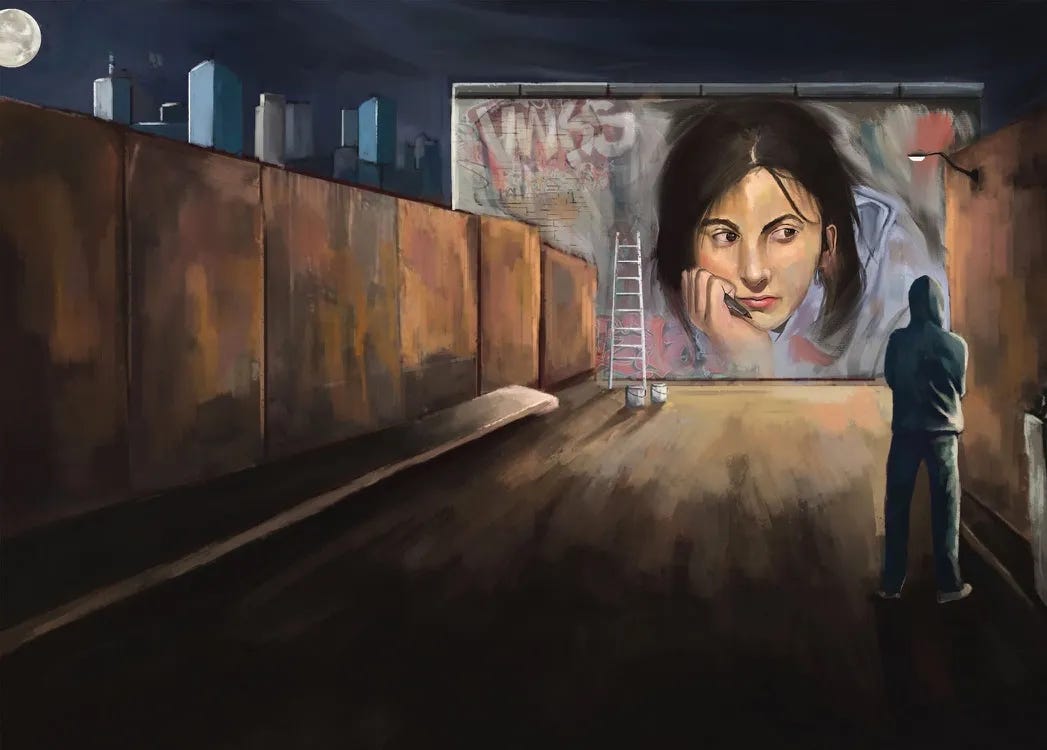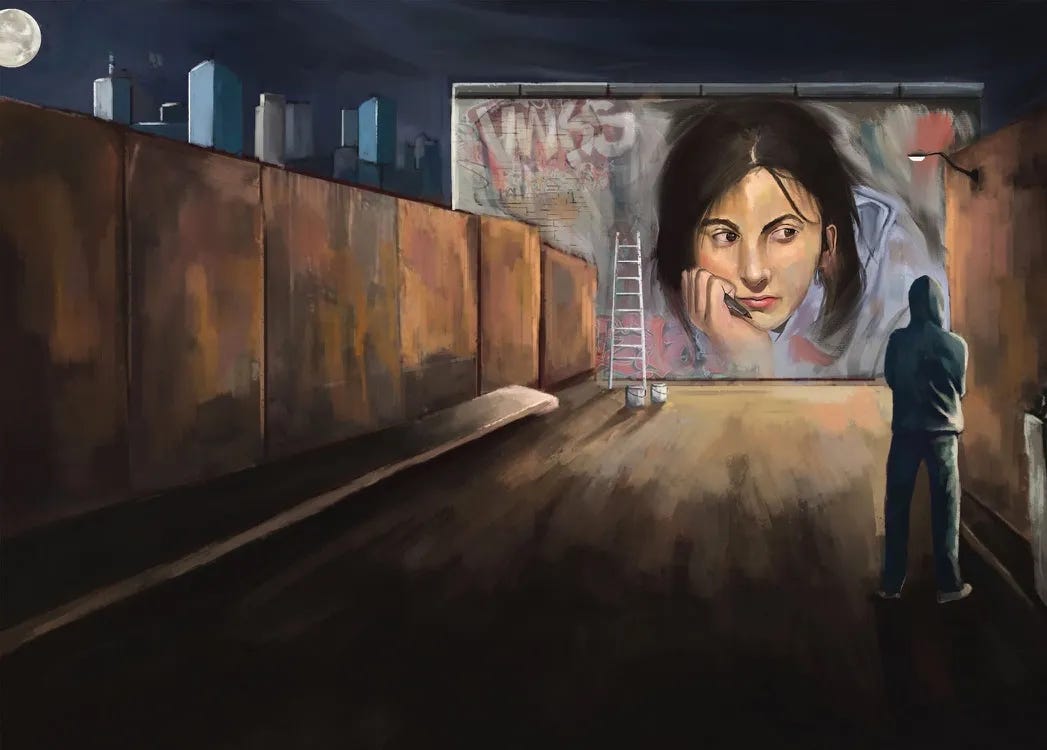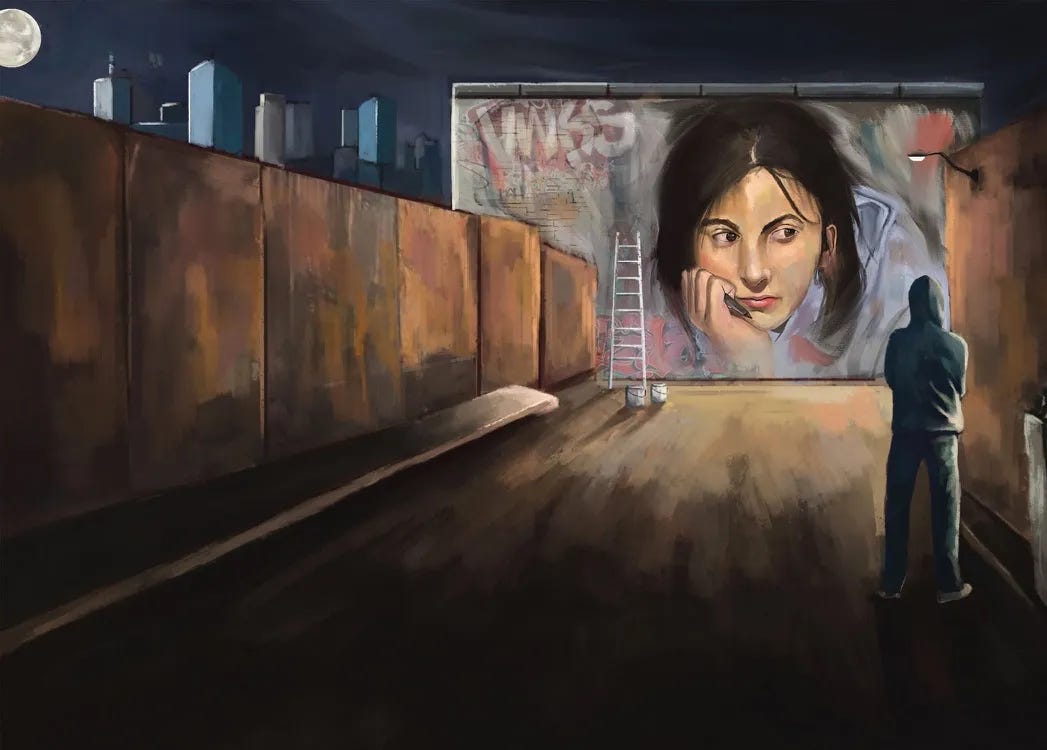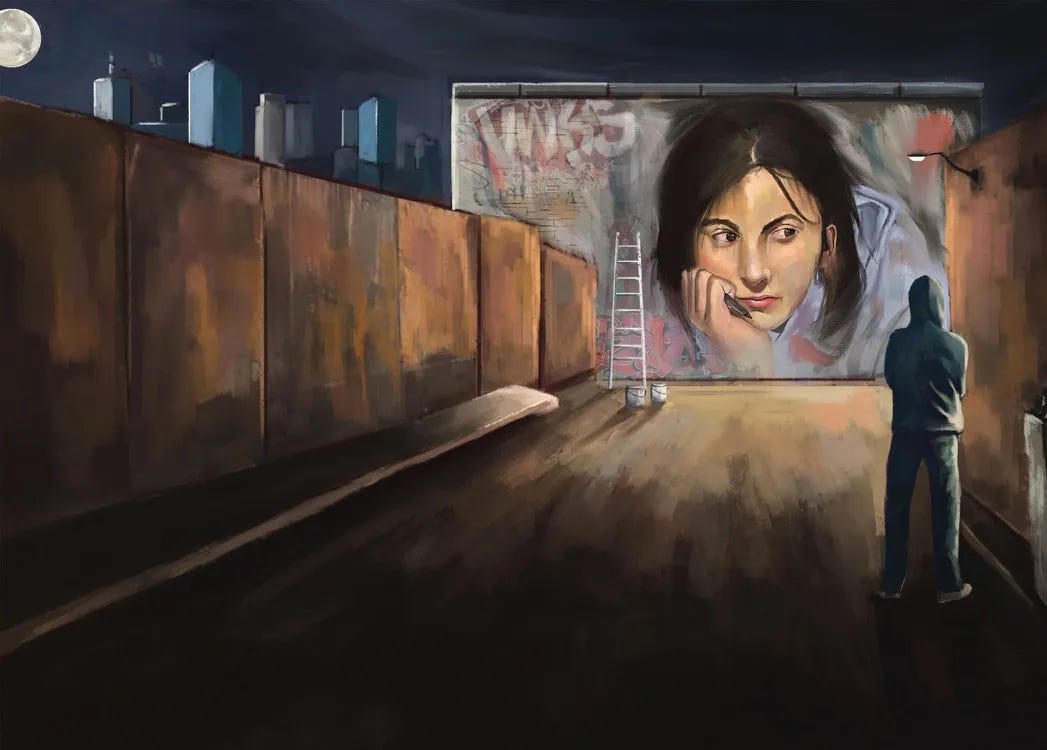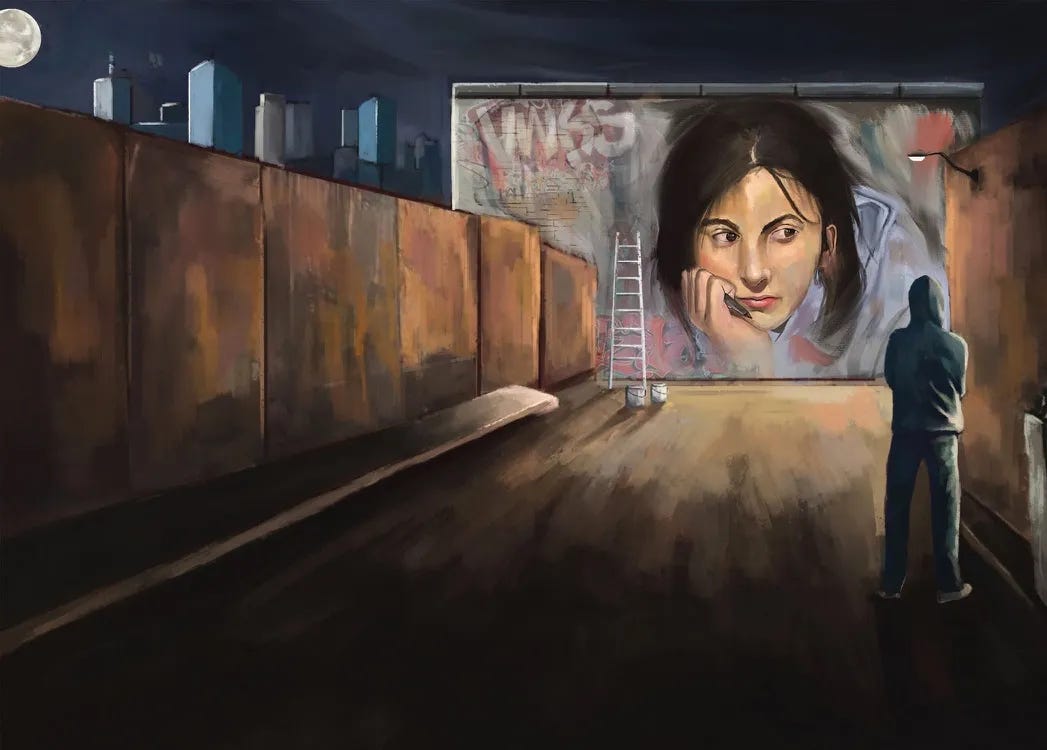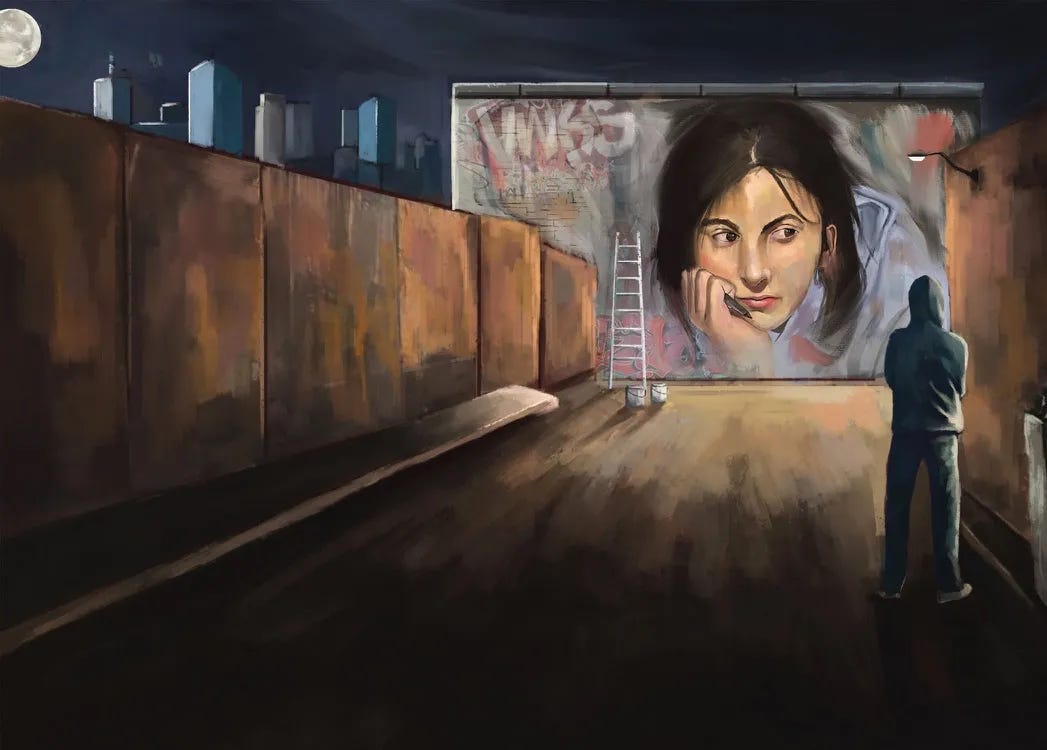Zeph’s painting of the old stone wall with the glimpse of the beach beyond seemed so real when I saw it earlier this evening. I could hear the surf breaking on the rocks. I could smell the salty breeze. I could hear the gulls call, I swear I could, though my feet were flat on the cold concrete of the warehouse floor.
It was only when Zeph touched me on the shoulder that I realised I’d been holding my breath. For ages, it seems, because then I started taking these great gulps of air. I could hear Zeph’s voice from a long way off: ‘Are you OK Harriet? Harriet!’.
I don’t think I responded, not straight away in any case, because suddenly, as soon as I remembered where I was and what I was looking at, I knew, as clear as a bell, exactly what I was going to do.
I was going write a story for my English assignment.
I can’t wait to start.
It will involve Ms McInness’s red ruby brooch, which I was holding just before meeting Zeph at the warehouse.
And it will involve Zeph and me going through this door and into a Grimm-inspired landscape on some epic quest.
It was hard to get to sleep on Saturday night, mainly because so much was happening: Zeph knocking on my window on Friday night, me arguing with Grandpa in the morning, Zeph showing me his painting, the conversation with Ms McInness about the red ruby brooch and then having this idea about writing a story. Then yesterday morning – Sunday – I bounced out of bed and couldn’t wait to get writing. I told Grandpa that I was going to lock myself away because I had something big I needed to work on for school, and he looked relieved, as if everything was back to normal.
Anyway, I cleared my desk, got out a wad of paper, and started to make a plan for my school project, an appropriation of a folk tale.
My online dictionary told me that an appropriation was ‘the deliberate reworking of images and styles from earlier, well-known works of art’ and that the creation of appropriations was ‘the hallmark of postmodernism’. I have only the vaguest idea of what postmodernism is, but Grandpa once said something about postmodernism’s invitation to disrupt conventions and play more intuitively, and that seemed like fun. Could I take a folktale, one of the Grimm stories maybe, and rework it in some way?
It seemed like a possibility. So I wrote a list of possible Grimm stories I could use, ones that I’ve heard Grandpa telling or that I’d read myself: Faithful John, The Nixie in the Pond, The Three Snake Leaves, The Sea Rabbit, Jack of Iron, Hans My Hedgehog, The Robber Bridegroom.
Just writing out the list was kind of thrilling. I love these stories, though some are really strange and most (as I’ve argued with Grandpa) are sexist and dated. But I love them all the same and couldn’t wait to start.
But which one? There were so many possibilities. None of them seemed particularly connected to a story that begins with a magic ruby brooch. I began to worry that I’d end up forcing connections.
For a while I played around with plots, to see if something would work.
Harriet and Zeph find themselves witnesses to the terrible tasks of Faithful John.
Harriet and Zeph are nearly drowned by the nixies in the pond.
Zeph is one of the princes who tries to win the hand of the strange and beautiful princess in the towers in the Sea Rabbit story.
Harriet …
Before long I had mind maps and lists and a sinking heart. Nothing was working.
But this morning I woke up wanting to try again. I still couldn’t see a way forward, so after our English lesson, I asked if I could meet with Ms McInness. She suggested lunchtime.
When we met over sandwiches, I explained how I now had pages of plans but still no clear way of getting into the story.
She looked … I don’t know … kind of all furrowed-of-brow.
‘What do you think?’ I asked after an uncomfortable silence.
‘I’m not sure,’ said Ms McInness. ‘I’m trying to think back to times when I’ve felt stuck.’
‘It’s not so much stuck as overwhelmed,’ I said. ‘There are so many possibilities, but none of them feels right.’
‘You’ve always been taught to plan out your work before you begin, right?’ she asked at last.
‘Kind of,’ I said. ‘Last term Mr Jensen made us submit essay plans or story outlines. Just between you and me, I don’t like Mr Jensen. He gives me the creeps.’
Ms McInness smiled.
‘Have you ever watched a little kid in a sandpit?’ she asked.
‘Yes?’ I said.
‘How they build things, sometimes quite complicated things?’
‘Yes.’ Where was this going, I wondered.
‘Did you ever see a little kid make a plan first?’
‘So I should just plunge in?’ I said.
‘Why not?’ she replied. ‘See where it takes you. Go on an adventure with your characters.’
‘But it has to be an appropriation,’ I said. ‘Which Grimm story should I rework do you think?’
‘Just begin to write. Let your characters take you to a world that has Grimm-like images. Just see what happens.’
I left the meeting feeling a touch sceptical, but also reinvigorated. Ms McInness seemed quite excited too.
I’m going to start later on tonight.
So I followed the advice Ms McInness gave me last week and I’ve just let the characters take me wherever.
I think it’s working.
And today we had the best session, me and Ms McInness. She’s suggested we have weekly meetings where I can show her what I’ve done, or where we can work together through any obstacles. We’re meeting every Monday at lunchtime until the project is due, at the beginning of October. So I’ve got about three weeks to go.
I told her how I’d followed my two characters onto the beach and then into the forest, and how the Harriet in my story had been drawn towards the nixies in the pond.
‘Ah,’ she said. ‘So your characters have discovered an image or motif you can appropriate.’
‘I guess,’ I said.
‘You don’t sound too sure.’
‘I’m worried that I’ve shoved it in to meet the criteria, that it doesn’t really work with the story.’
‘So read it to me,’ said Ms McInness.
So I read.
Once the riders had disappeared, Harriet and Zeph made their way along the track and into the forest. They hadn’t been walking for long before they came to a pond.
Harriet could hear beautiful music coming from the water, calling to her, and she began to wade into the pond.
It was the nixies.
But Zeph pulled Harriet back before she disappeared and the spell was broken, and so they were able to continue on their way unharmed.
‘Well, it’s clear,’ said Ms McInness when I’d finished reading. ‘But you’re worried that it doesn’t really work.’
‘It’s like I’ve just shoved it in to meet the criteria.’
‘Forget the criteria for a moment. What are you wanting to get out of this project?’
I was quiet for a few moments. This was a good question. What was I wanting to achieve? It was definitely more than just to meet the criteria.
‘I want to become a better writer,’ I said. ‘I want to learn new stuff about writing.’
She got me to read it out loud again.
‘You write as though observing from a distance,’ she said.
‘I don’t get you.’
‘Well, in one sense you’ve captured the kind of storyteller voice that you find in the Grimm tales. You aren’t like a novelist, getting right inside the characters. You’re like the teller of a folk story, just describing the action. They walk along a path and enter the forest, Harriet is tempted to enter the water but is pulled back by Zeph. They walk on.’
‘So it works.’
‘If that’s what you’re aiming to do, to be a storyteller in the folk tale tradition.’
‘Isn’t that what I’m supposed to do?’
‘You can do that if you want. But appropriating something doesn’t necessarily mean being faithful to it. In fact you can play around with it, bend it to your own purposes and ambitions, if that’s what you want to do.’
‘I think I want to be more like a novelist.’
‘So allow yourself to imaginatively inhabit the place, the characters, the emotions. How is Harriet feeling after walking all the way from the beach to the forest on a hot day? What do they hear and see in the forest? What is going on in Harriet’s mind as she approaches the water? That kind of thing. Try to experience it more viscerally.’
I wasn’t entirely sure what ‘viscerally’ meant, but I looked it up afterwards. ‘Relating to deep inward feelings rather than to the intellect,’ my dictionary said.
So that’s what I tried to do. I tried to imagine what deep inward feelings the girl in my story must have felt at the nixies’ pond.
And then I wrote. For hours after school today and then tonight after dinner. It’s really really late now. But I feel kind of elated.
I’ll show her the re-write tomorrow.
I’m on my way, I think.
For today’s session with Ms McInness, I’d taken along a bit where Harriet is crawling through the tunnel in the pitch dark to where the tunnel floor suddenly ends.
‘So read it out loud to me,’ Ms McInness said.
She had now got to the edge of the waterfall’s drop. She could feel the edge with her hands and hear the water spilling over the ridge and plummeting downwards. No matter how far she stretched, or how carefully she listened, she couldn’t tell how far the water travelled through the air before splashing in a pool down below. Death might come quickly if she let herself be washed over the side. Or it might come slowly and painfully if she broke a limb and lay in some pool too shallow for drowning.
She found that here, for some reason, the roof of the tunnel was significantly higher. She could stand up. It was good to feel her legs stretch in a different way, to feel no longer pressed in by the tunnel walls.
And there was another new sensation. Harriet was standing at the edge of the drop wondering what her next move might be when she became aware that the black surrounding her wasn’t quite as black as it had been. Or that there was, just ahead of her, a black not quite as thick and impenetrable.
Ahead of her? She’d assumed that the tunnel simply led to the waterfall, that the only alternatives were back to the well or down to the base of the waterfall. She stared ahead, opening her eyes wide in the hope that, if there were something to be seen, this might help.
No clearer image formed itself in front of her. Perhaps she was imagining it. But, if there are shades of black, the shade in front did seem less black than the rest.
Could the waterfall be just a gap in a tunnel that continued to the outside? A gap that might be somehow negotiated? Or bridged? It was a thought that gave Harriet a new reason to hope.
‘What did you notice as you read it?’ Ms McInness asked.
‘I noticed my heart beating.’
‘The story had that effect on you?’
‘No, I think it was because I really wanted you to like it.’
Ms McInness smiled. ‘But you also want me to help you to make it better,’ she said.
‘Yes.’
‘So, when you read it out loud just now, did you notice anything about the writing?’
‘That I repeated some words, like far and feel.’
‘So look at the repetitions tonight and decide whether you think they work or not. Anything else?’
‘I didn’t like it as much as I liked it last night when I wrote it.’
‘And why do you think that might be? Because you were worried about my reaction?’
‘Maybe. But not entirely. I don’t know. It just didn’t have … It just … I don’t know.’
‘Read out the verbs,’ said Ms McInness.
So I read them out.
… got … feel … hear … spilling … plummeting … stretched … listened … tell … travelled … splashing … come …
‘That will do. Now the nouns.’
… she … edge … waterfall … drop … edge …
There was another repetition I hadn’t noticed.
… hands … ridge … she … she … water … air … pool …death … she … herself … side …
‘That’s enough,’ said Ms McInness. ‘I want you to work on this passage tonight and to pay special attention to the nouns and verbs. Try to use as many strong nouns and strong verbs as you can.’
‘Strong?’
‘Nouns that create a strong image, verbs that describe a vivid action or emotion. Some of yours already do this, but there are quite a few that don’t. Not all your nouns and verbs have to be strong, but see what happens if you pay attention to them.’
‘OK.’
‘And how many words have you written here?’
‘Around three hundred.’
‘After you’ve looked at the repetitions and strengthened verbs and nouns, see if you can cut the passage by 100 words.’
‘But last week you were encouraging me to be the novelist rather than just the storyteller, and now you want me to just tell the story!’
‘No, I just want you to try to be a novelist using fewer words.’
‘You want me to cut out one third?’
‘I want you to try.’
So that’s what I’ve been doing tonight. Trying. I’ve had to use my thesaurus to find stronger verbs and nouns, and I’ve discovered the meaning of words I’ve never used before. I’ve cut out a few whole sentences, and then some phrases and words.
It’s been really really hard work.
It’s been really really fun.
I can’t wait to show it to Ms McInness tomorrow. She better say something nice about it this time!
Harriet lay now with the stream swirling around her before it plummeted down into the void. She wanted to give up the struggle, to let the flow carry her over the edge to what she imagined would be a quick death on rocks far below.
But Zeph and the others were depending on her. She couldn’t capitulate now.
She lay for some minutes, recovering her breath. Then she tentatively lifted her head. The tunnel’s roof, she discovered, was even higher here. She raised herself into a squat, and then, very slowly, she stood upright.
She stretched out her arms. It felt good. Like a release. She sensed the blood in her veins flowing again.
And then Harriet noticed that the black just ahead of her was not quite as thick and impenetrable as the black through which she’d been crawling.
Was it possible that the tunnel continued beyond the waterfall? Was this perhaps just a gap? A gap that might be bridged?
It was a thought that gave Harriet a new reason to hope.
One hundred and seventy four words! I’ve cut it by way over 100 words. And I think it’s stronger.
I suppose I should now go back and radically re-write everything I’ve already written. But there’s no time. I’ve only got a couple of weeks before I have to submit my story.
I don’t care really. I don’t care that it won’t be perfect. I’m learning how to write.
I’m becoming a writer.
Grandpa and I had a weird conversation tonight. Or at least it ended weirdly. I still don’t really understand why.
We were having dinner together, just the two of us (Zeph’s got some kind of a bug and has been off school and in bed all day) and at first it was just like it used to be.
‘How’s school going?’ he asked, and I told him how much I was loving English. I described the awesome sessions I was having with Ms McInness.
‘I really like her,’ I said.
‘I know,’ said Grandpa. ‘She really likes you.’
‘Do you think she’s playing favourites?’ I asked. It’s not a new thought for me. I’ve been aware, when I go to the classroom for my Monday lunchtime meeting with Ms McInness, that I’m hoping no-one notices. It feels privileged. Once I’m in the room, or when I’m writing, I forget about it. But at other times a kind of guilt rises to the surface.
‘I think she’s doing her job,’ said Grandpa. ‘She’s helping a student become more skilled.’
‘But she doesn’t help others the way she helps me,’ I said. I could feel myself flush a bit.
‘I’m sure she would if others showed the same enthusiasm,’ said Grandpa. ‘Of course she loves working with you. Who wouldn’t?’
‘Mr Jensen didn’t,’ I said. Grandpa met Mr Jensen at a parent–teacher night. He didn’t like him. ‘I worry about what others might think if they knew how much she helps me,’ I said.
‘Perhaps this is what it used to be like,’ said Grandpa. He had that faraway look that he sometimes gets when he’s trying to see a connection between two ideas with no obvious connection.
‘What do you mean?’ I asked.
‘In my day … the times you keep wishing were still with us, or so you keep saying … classes were smaller. There were fewer distractions for a teacher. I’m probably romanticising. But, when I was a boy, my teachers seemed to have more time …’
His voice trailed off. He still had that faraway look. I waited.
‘No, that’s not it. There were Rodney Jensens then too. That’s not it …’
Again a pause. Grandpa had shut his eyes, and was rubbing his forehead.
‘I’m not sure I can explain this all that clearly,’ he said at last. ‘And maybe it’s nonsense. But so much about today’s world has become over-systematised. Systems bring order to chaos and systems are necessary, but too often systems take on a life of their own. They then suffocate, like a vine growing out of control, blocking out the light, constricting the life around which it’s wrapped itself.’
Grandpa’s eyes were still shut and he was now frowning. The rubbing of his forehead intensified.
‘Teaching, like so much else, has become increasingly suffocated by systems. Assessment systems. Behaviour management systems. OH&S systems. Unit outlines, lists of outcomes to be addressed, record keeping and reporting systems.’
I had no idea what this had to do with Ms McInness helping me with my story.
Grandpa opened his eyes. He looked at me and smiled.
‘So there you have it,’ he said.
‘There I have what?’ I asked.
‘That’s why Molly spends so much time with you. It lets in the light. She feels less suffocated. She feels the juices stirring.’
A shadow passed quickly over Grandpa’s face. There was something faintly uncomfortable about this last image. We both felt it. But what he said next had a lighter, breezier tone.
‘It’s fun for both you, and it feels like it’s meaningful and significant in some necessary way,’ he added.
‘It is and it does,’ I said.
It is and it does. Absolutely.
And yet the conversation felt uncomfortable, and I’m not sure why.
I stayed behind after English class on Friday because I needed some advice from Ms McInness. I’d got to the part in my story when Zeph and Harriet meet Attor the priest in the castle, but I was having trouble describing Attor himself. I wanted him to be creepy so that when Zeph and Harriet come face to face with him, they feel their flesh crawl. But my attempts to describe him felt flat and cliched, like I was describing some character from a bad horror movie. Ms McInness read what I’d written and agreed.
‘Can you remember a time when being with someone made your flesh creep?’ she asked. ‘The more you can draw on your own experience, the more convincing your writing will be.’
I couldn’t think of anyone on the spot, but that night I was flicking through my journal and I came across the following:
I used to like English. I loved reading and writing in primary school. But not so much in high school. And especially not last semester. I hated English. Or at least I hated our English teacher, creepy Rodney Jensen. He sucked. Cold blue eyes that looked right through you, cruel sneery mouth. Sneer is such a good word. It describes exactly that horrible set of his fat lips, that icy baring of his slightly crooked teeth. And his breath, with that stale smell of whiskey or something. Oh, I could write a top horror story with him as the monster without a soul, torturing his victims before he put them slowly to death, enjoying every sadistic moment. Do I exaggerate? Well, I’m a writer aren’t I? Or will be! :-)
I read this with mounting excitement. Here was my model!
So I worked on it over the weekend, and today at our lunchtime session I read out the following short passage to Ms McInness:
Attor the priest, when he swept into the room, was dressed in his long scarlet robe. A jewelled necklace hung from his neck, rings adorned his fingers. He began a whispered conversation with the guard, during which the only words Harriet heard were a scornful ‘Oh she does, does she!’
Harriet returned his stare as he regarded her from across the room. She’d seen him only at a distance at the ceremony. Now she noticed his cold blue eyes, his cruel mouth set in a kind of supercilious sneer. His lips were fat and his teeth were slightly crooked. She felt her flesh creep as he left the guard and approached.
‘Who are you?’ he asked, smiling his nasty smile. His breath smelt of strong liquor.
There was a silence when I finished reading, which at first I interpreted as being disapproval, but when I looked up Ms McInness was smiling.
‘Mmm,’ she murmured.
Silence again.
‘Does it work, do you think?’ I asked. I was smiling too, now.
‘Made my flesh creep,’ she said.
‘I followed your advice,’ I said.
‘I know.’ Then she put her finger to her lips. ‘Enough said. We will not speak of this again. I’ll see you in class tomorrow. You’re doing a wonderful thing, Harriet. This is very exciting. I can’t wait to read the finished story.’
For the last four weeks I’ve lived another life, obsessed with this story. Things have happened around me, and I guess I’ve been involved in them to a certain extent. Zeph is living in the spare room and Grandpa’s trying (not a lways successfully) to be good about it. School days have been drifting by but I couldn’t tell you much about any of the lessons. I’m sure those around me – Grandpa, Zeph – have found me vague and emotionally absent. But I’ve loved being obsessed like this. Writing every night until the early hours. Spending most of the days imagining possibilities for the next scene.
I’m exaggerating. I haven’t been completely unconnected to the world around me. I’ve told Grandpa and Zeph about the story, though not about what is happening in it. I want to see their reaction when they read the whole thing. And of course I talked incessantly with Ms McInness. It’s been great.
I finished the story last night. It’s done. I feel kind of washed out.
But I’ve also been feeling restless too. Something has changed, or is changing. Something is shifting. It’s as though the world I inhabited before I wrote this story has passed, and the world I now inhabit is different. Somehow.
This isn’t going to be easy to explain. I’m not sure what I mean. I guess I’m writing now to try to be clearer about this feeling.
A part of it is to do with Zeph. A big part, if I’m honest.
Before seeing his painting, I experienced Zeph as this awkward kid with nothing much to say for himself. He seemed kind of jumpy and impulsive, or just withdrawn and unapproachable. He was a bit weird. Sort of intriguing and gentle, but weird.
Then I saw his painting. Did seeing the painting open my eyes to another Zeph? Partly. Looking at that amazing painting, at the detail and the life and the beauty of it – because it really was beautiful, so full of colour and movement and feeling – woke me up to the fact that the gawky boy standing next to me in the warehouse had lots more to him than I’d previously thought.
But then I started to create an imaginary Zeph, brave and skilled and resourceful. This was definitely a creation from my imagination; I’d not seen anything of these qualities in Zeph himself.
Is that true? Maybe not completely. When he came to my window on that stormy night, and when it was obvious that he’d been sleeping rough for a while, I suppose that somewhere in the back of my mind I realised that he’d lived a pretty resourceful life, holed up with that dickhead of an uncle in that smelly apartment block, spending time living on the streets.
But the Zeph in my story was still definitely my own creation. My own projection, I guess you’d say, of the kind of companion you’d want on an adventure into the unknown. In my story he seemed always to know what to do. He was at home in the forest. He understood about the nixies. He led the way through the old town. He looked after our food and shelter. And he became increasingly articulate. Good to talk to, good to spend time with.
My creation.
And yet, since writing the story, I’ve glimpsed these qualities in the real Zeph. Or I think I have. Am I projecting again, but this time projecting my creation onto the real Zeph? Or am I seeing real qualities that have become visible to me only because I’ve first imagined them?
I’ve been thinking about these things because they’re interesting: what’s real, what’s imagined, and what’s the link?
But there’s another reason. I’m aware that I’ve developed some feelings for Zeph and I’m not sure that I trust them.
Do I like the real Zeph, or just my idea of him?




